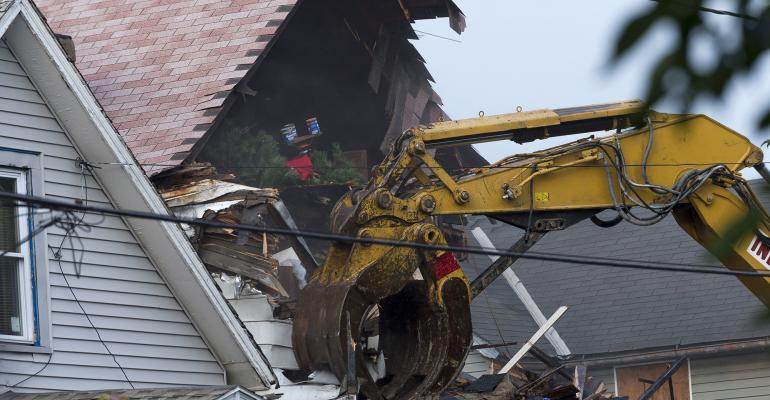A Maryland District Court recently denied taxpayers a charitable deduction for salvaged materials they donated from a house that they had deconstructed. (Mann v. United States; No. 817-CV 00200 (U.S. District Court, District of Maryland)).
Conveyance to Charity
The donors bought a remodeled colonial-style house in Bethesda, Md. However, they later discovered the house, although in good condition, had a wet basement. And they also didn't consider the layout to be suitable. So, they decided to have the house demolished and build a new one.
Before the demolition, the donors contacted Second Chance, an Internal Revenue Code Section 501(c)(3) reconstruction charity, about donating the house. Second Chance engages in property “deconstruction”—the salvaging of building materials, fixtures and furniture from properties. Second Chance employs disadvantaged individuals needing workforce training for its deconstruction. And Second Chance sells some salvaged items at its retail store; it tries to recycle the rest.
Although Second Chance performs deconstruction, it doesn’t perform demolition—and so advises potential donors.
To defray the cost of the deconstruction program and workforce training, Second Chance asks individuals who are donating property for deconstruction to supplement their donation with cash, in an arrangement called a “funded deconstruction.”
The donors conveyed the residence, all the personal property and the real property to Second Chance. Second Chance tells all donors that generally they could claim a tax deduction for all material that “crosses the threshold of Second Chance’s warehouse. Second Chance creates a list of everything it removed from a site, and the fair market value of those items could then be deducted, with the value to be determined by a qualified appraiser.”
Second Chance expected the deconstruction of the donors’ house to yield items with a fair market value of at least $150,000 at a “conservative minimum”—and that translates to a $45,000 tax savings.
Second Chance also “expected” the donors to make a $20,000 cash donation to it to offset Second Chance’s expected deconstruction costs—leaving the donors with $25,000 to $30,000 in tax savings.
The donors sent $10,000 to Second Chance in 2011 and only $1,500 in 2012. Second Chance acknowledged both donations, verifying that the donors “did not receive anything of value in exchange” for the donations and stating that “the entire value of your gifts is deductible.”
Appraisals
The donors commissioned three appraisals, two for the value of the house. Using a sales comparison methodology, which relies on comparable home sales in the same neighborhood, the first house appraisal valued: the entirety of the property at $1.875 million; the property without the house at $1.2 million; and solely the house at $675,000. The $675,000 valuation was based on the house at its highest and best use. That appraisal determined keeping the house intact but moving it to another site for use as a residence. The appraiser concluded that moving the entire house to another site would “produce the highest return to the non-profit organization” and was thus superior to deconstruction, which would “destroy part of the structure during the process.”
Because the house appraisal was based on the value of the house as moved intact to another site for residential purposes, the donors got a second appraisal to establish the donation value of the house if it were deconstructed; thus, not put to its highest and best use.
The personal property appraisal included an itemized list of 40 pieces of furniture or home decoration, individually valued and photographed.
House Deconstructed
Second Chance informed the donors that they hadn’t been able to extract as much salvage material from the house as they had hoped. Second Chance didn’t keep a manifest or other record of exactly what materials were salvaged from the house. Second Chance incurred $13,144 in expenses in deconstructing the house.
Charitable Deductions Disallowed
On their 2011 tax return, the donors claimed charitable donations: $675,000 for the value of the house; $24,206 for the value of the personal property; and $10,000 for the cash donation to Second Chance. On their 2012 tax return, the donors claimed a $1,500 charitable deduction for the cash donation to Second Chance.
The IRS disallowed all the claimed deductions. The donors paid the IRS for a tax liability of $191,638 for 2011and $2,464 for 2012 together with statutory interest. They then sued the IRS in a federal district court for a refund of their payments.
District Court Ruling
The court ruled that the donors under governing Maryland state law didn’t record the transactions and that makes them invalid for federal tax purposes; also they had invalid appraisals and failed to comply with the substantiation rules.
Personal property. The court concluded that the donors have effectively abandoned their claim for the $24,206 personal property deduction.
Regarding donors’ cash gifts. The IRS maintained that those payments to Second Chance were properly denied because they were a quid pro quo for Second Chance’s deconstruction services and thus not proper charitable donations.
After an additional two pages of its opinion and citing cases, the District Court allowed the deduction for the cash gifts.
© Conrad Teitell 2019. This is not intended as legal, tax, financial or other advice. So check with your adviser on how the rules apply to you.





